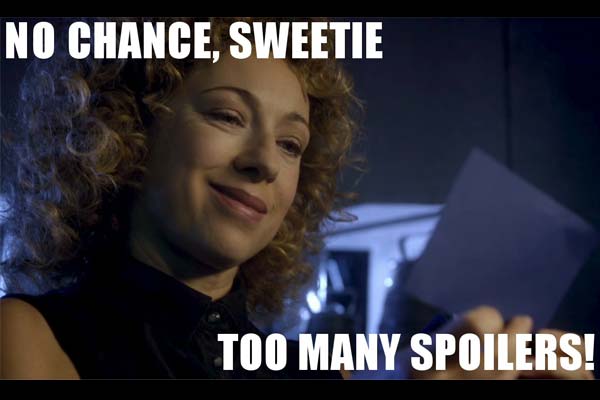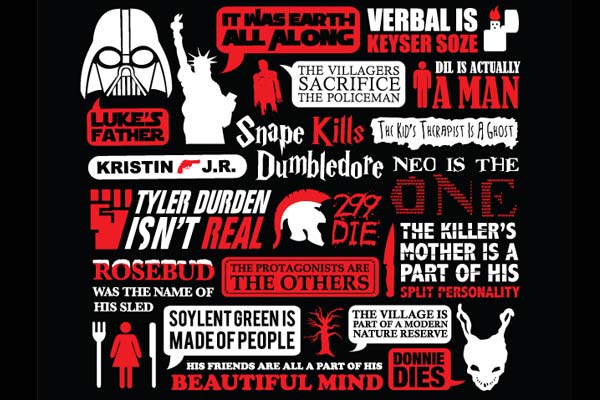Dean Norris says I have to wait another day before I can start spoiling the latest 'Game Of Thrones' episode.
At least, according to an infamous Tweet by the Breaking Bad actor last year, wherein he declared the grace period for spoilers to be 48 hours after international release – although his phrasing wasn't too diplomatic:
MORON ALERT 48 hours after intl release, if u not caught up on BB? a) stay the fuck off twitter b) @mindykaling take ur spoiler like a man — dean norris (@deanjnorris) September 18, 2013That said, avoiding Twitter lest your fiction of choice be spoiled is nothing new; Twitter is a spoiler minefield. All it takes is one misdirected glance at your feed and bam! A whole week's worth of anticipation and suspense obliterated. And if Twitter is the volatile landscape where hopes and dreams are regularly blown to pieces, then it's only fair to label 'Game Of Thrones' as the primary arms dealer behind it all.
The show's impact on “spoiler culture” is so significant that 'Game Of Thrones' spoilers are starting to affect how we conduct ourselves in the real world. For example, by now you've probably heard of the rogue math teacher who threatened his unruly class with spoilers to shut them up – successfully. I gave that strategy a go, and discovered the ability to clear my living room of my housemates simply by starting a sentence with, “Not to spoil Game Of Thrones, but...” 
This is not uncommon behaviour, not anymore. Even in public, one must be careful about spoiler-laden talk. A friend of mine, having read all the 'Game Of Thrones' books so far, was at a bar discussing events that had not been depicted in the show yet. A random guy walks past, overhears part of the conversation, and furiously berates my friend for giving away too much, despite the fact that my friend was not directly addressing him.
Now, I want to agree with Mr. Norris' stance that the acceptable grace period for TV show spoilers is about 48 hours. I'd even be willing to stretch that to a week under certain circumstances – during university exam periods, for instance. After that point, the onus is on you. After that point, you cannot reasonably get upset when you overhear a spoiler. If you're that serious about your fandom, then it's up to you to keep up to date.
Snarky guy in coffee queue eyes off my Bioshock Infinite t-shirt, suggests I "probably haven't even played it". So I told him the ending. — Rae Johnston (@miss_raej) April 10, 2013
But there are those who believe 'Game Of Thrones' is exempt from any sort of grace period due to the books having existed for a long time – the first is almost two decades old. Stephen King recently copped a lot of flak for Tweeting about the infamous “Purple Wedding” almost immediately after it aired, to which he replied:
Come on, guys, it's been in the books for 15 years or so, and the episode ran tonight. — Stephen King (@StephenKing) April 14, 2014
Despite the snobby tone of his comment, it does bear a certain amount of logic, especially when you consider his follow-up Tweet:
Another spoiler: Romeo and Juliet die in Act 5. — Stephen King (@StephenKing) April 14, 2014
I mentioned this notion, that 'Game Of Thrones' is exempt from a spoiler grace period, to my friend Tony Cavanaugh. Like King, Tony is a published author – his third novel came out just last month – and I was curious to hear his take on the matter. His response? “There's no such thing as a Thrones spoiler, because those plots are already in print.”
Of course, not everyone is good mates with novelists, but that doesn't mean the above opinions are uncommon. I'm sure you know that one guy who's read all the 'Game Of Thrones' novels and is unashamed about openly discussing the story, referring to the age of the books when confronted with accusations of spoiling. So, if these people have all read the books ahead of time, then how come they're enjoying the show just as much as everyone else? Well, the answer may lie in a 2011 study by members of UC San Diego's psychology department.
Multiple mainstream news outlets covered the study, due to its peculiar findings. In a nutshell, the study found that people are more likely to enjoy a story if it has been spoiled for them beforehand. Social psychology Professor Nicholas Christenfeld even went as far as saying, “Plots are just excuses for great writing. What the plot is is (almost) irrelevant.”
Now, that has always been my stance when it comes to creative writing. More often than not, spoilers tend to cover up surprising plot twists, which, as a budding journalist and aspiring author, I see as cheap gimmicks. The written word equivalent of playing 'Wonderwall' by Oasis on an acoustic guitar at a house party. In other words, tacky and overdone, unless pulled off exceptionally well. Ideally, the merits of a good story should not hinge upon the surprise factor of one particular moment or scene.  But why, then, is there such an anti-spoiler culture pervading our consumption of entertainment? Why do we, as an audience, value these narrative jack-in-the-boxes so highly?
But why, then, is there such an anti-spoiler culture pervading our consumption of entertainment? Why do we, as an audience, value these narrative jack-in-the-boxes so highly?
Honestly, I think it has something to do with the instant gratification, “gimme gimme gimme” way of life in the 21st century. We've become so self-entitled, so used to getting what we want at the click of a button, we've forgotten the old notion that it's not the destination but the journey that counts. Putting this into the context of spoilers, modern day audiences don't appreciate the “story” as much as they do the “experience”.
The element of story is paramount to me. It's why I love discussing newly released movie trailers and TV spots on internet forums. It's why I can read 'The Catcher In The Rye' over and over and still find myself laughing (or getting a bit teary) at the same bits every single time. It's why the original 'Bioshock' has one of my all-time favourite narratives of any medium, even though my friends deconstructed the whole story for me before I bought the game.
That's just me, though. If you're the kind who likes to be kept in the dark so you can discover things for yourself, that's perfectly fine. But just remember, a good surprise only lasts for a moment. A good story, on the other hand, will last forever.

